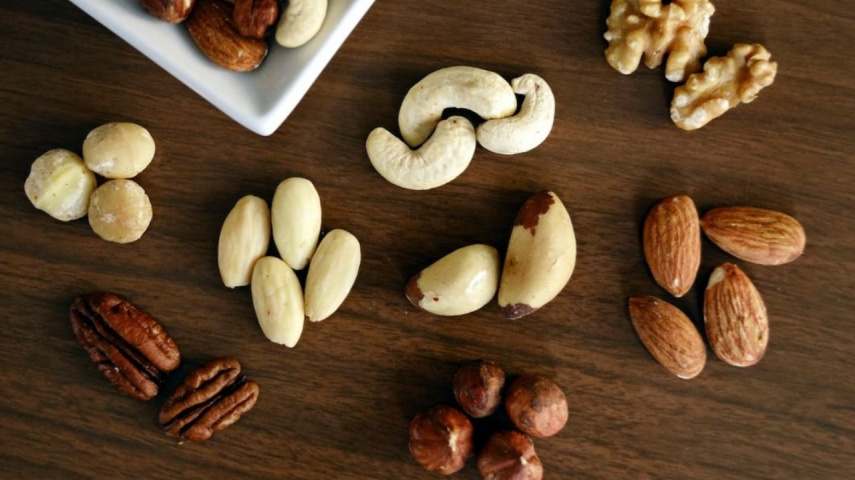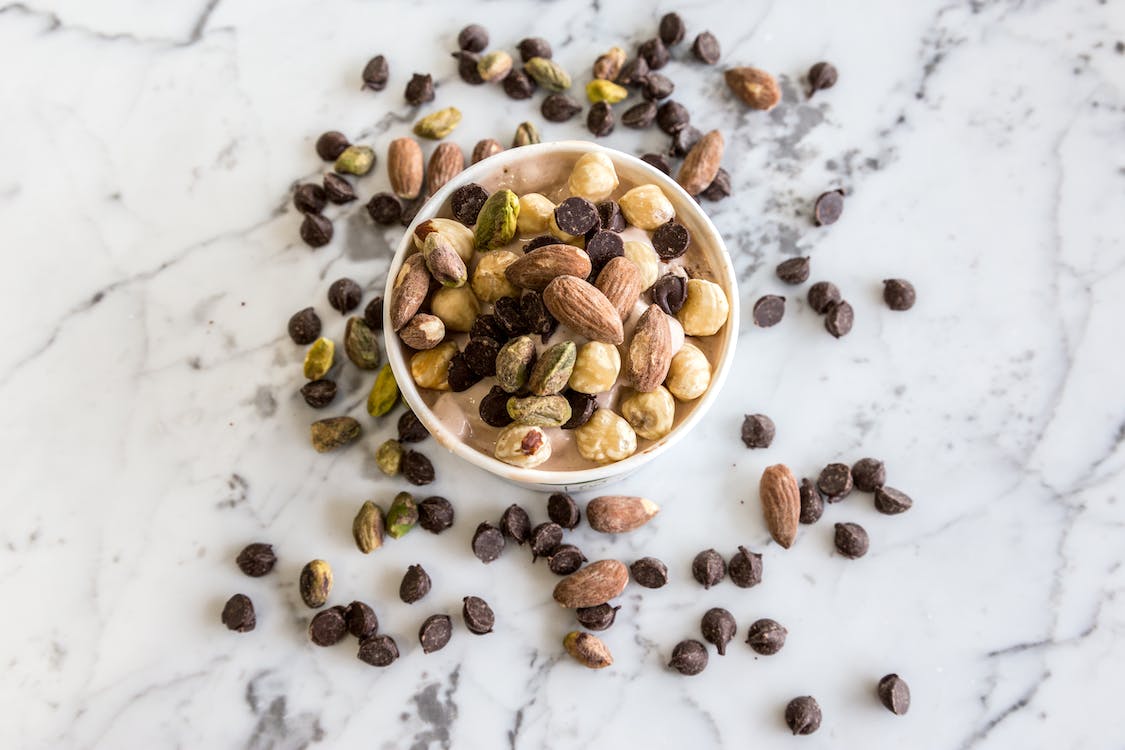Nuts are Fattening: Debunking the Myth on Weight Gain
Researchers have debunked the myth that nuts are fattening. Read on to learn how nuts can be a healthy and satisfying snack that can aid in weight loss.

For the longest time, the incorrect assumption that nuts are fattening as a snack has been going around. According to Trish Gomez, a Registered and Licensed Dietitian and a Certified Personal Trainer, “Nuts are calorically dense as they contain a lot of calories per oz. They are also high in fat. It is easy to overeat nuts, as the serving size is small.” But in reality, they are actually a fantastic addition to any diet. Whether you are trying to incorporate more plant-based foods, following a high-protein diet, or just looking to boost your overall health, nuts are the go-to options. They are packed with essential nutrients and unsaturated fats. Surprisingly, research shows that nuts don't contribute to major weight gain (1). In fact, they can help you maintain a healthy weight. So let's dive into a few such amazing benefits of including them in your diet.
What Are Nuts?
A nut is a fruit made up of a typically edible kernel that is protected by a tough or hard nutshell. They come in different shapes and sizes. Typically, hazelnuts, chestnuts, and acorns are true nuts with hard shells and edible kernels. On the other hand, almonds, pistachios, and cashews are actually seeds, and what's more, peanuts are considered to be legumes! But in the culinary world, they're all treated the same. However, the relevant part for us here is that all of them are super healthy.
Packed with nutrients and antioxidants, they're a great addition to your diet (2). Even though the fat and calories in nuts are high, the majority of that fat is unsaturated. This is proven to be good for your heart and overall health (1). Trish Gomez also says, “Diets high in saturated fats are associated with increased heart disease risk, while diets higher in unsaturated fats, and lower in saturated fats are associated with reduced heart disease risk.”
The nutrients in nuts are as follows (3):
- Nut Calories - On average, nuts have around 607 kcal per 100 grams.
- Proteins - They contain approximately 20 grams of protein per 100 grams.
- Fats - They have around 54 grams of fats per 100 grams.
- Fibers - They contain about 7 grams of fibers per 100 grams.
They are a rich source of Vitamin E, an antioxidant compound that aids in cancer prevention (4). Additionally, nuts are excellent sources of folic acid, magnesium, calcium, potassium, and phosphorus (2). They contribute to a variety of health benefits by offering these vital nutrients.
Health Benefits of Nuts

Let us now look at some of the important health benefits which nuts provide upon consumption.
Antioxidant Powerhouses
Nuts contain polyphenols which are strong antioxidants that can really take on oxidative stress (5). This happens when there are excess free radicals that can mess with your body and up your risk of diseases. Thus nuts help us fight these free radicals. A study even found that walnuts have a greater capacity than fish to combat free radicals (6). Plus, the antioxidants in nuts like walnuts and almonds can protect the precious fats in your cells from getting damaged (7).
Boost Good Cholesterol
Nuts can actually help you with your cholesterol and triglyceride levels. They have the ability to lower triglycerides and bad LDL cholesterol while boosting the good HDL cholesterol (8). Pistachios, in particular, have been shown to lower triglycerides in people with obesity and diabetes (9).
Likewise, macadamia nut, one of the high-calorie nuts, is proven to reduce LDL cholesterol in both women and men (10). The high levels of monounsaturated and polyunsaturated fatty acids in nuts are what make them so effective in bringing down our cholesterol levels.
Anti-inflammatory in Nature
Eating nuts can actually help reduce inflammation and support healthy aging. Certain nuts, like Brazil nuts, pistachios, almonds, and walnuts, have been shown to combat inflammation in both healthy individuals and those dealing with conditions like diabetes and kidney disease (9), (11), (12). So, if you're looking to promote a healthier, and more vibrant life as you age, then go for these nuts.
Reduces the Risk of Heart Disease
Nuts can actually help lower the risk of heart disease and stroke. Studies have shown that small, dense LDL particles can increase the risk of heart disease, but eating nuts can help decrease those risks. In fact, one study on the Mediterranean diet found that people who consumed nuts experienced a decrease in small LDL particles and an increase in large LDL particles, along with higher levels of good HDL cholesterol (13). Thus it reduces the risk of cardiovascular diseases.
Nuts for Diabetes
Nuts can do wonders for people with metabolic syndrome like type 2 diabetes. They've got some notable benefits when it comes to blood pressure, blood sugar, and overall health. They are low in carbs, so they won't cause a spike in blood sugar levels like other high-carb foods.
Studies show that nuts can also reduce oxidative stress, improve blood pressure, and have positive effects on other health markers for people with diabetes and metabolic syndrome (5). So by swapping out those higher-carb options with nuts, you can actually lower your blood sugar levels.
Improves Bowel And Gut Health
Nuts are packed with fiber, which does wonders for your digestion. In fact, 100 grams of mixed nuts contain around 7 grams of dietary fiber. This fiber helps solidify your stool by absorbing water and adding bulk to it. Thus maintains a healthy bowel. Apart from that, they also have unsaturated fatty acids and polyphenols that can positively impact the composition of your gut microbiota and keep your gut healthy overall (14).
Why Nuts May Not Cause Weight Gain?

It is a proven fact that nuts won’t cause you to gain weight. Despite being high in calories, they won't expand your waistline. In fact, researchers have conducted studies on various nuts like Brazil nuts, almonds, pistachios, and more. They found that eating these nuts is not linked to weight gain. In some cases, it's even associated with reduced measures of body fat (15). Therefore, it dispels the common belief that nuts are fattening.
Our contributor Dr. Allen Conrad, Doctor of Chiropractic at Montgomery County Chiropractic Center, says, “Adding nuts to your daily diet can help reduce body fat in the long run. As part of a balanced diet and exercise program, nuts offer a low carb low fat source of fiber. In general, eating more fiber helps you burn body fat faster. But, if you eat too many calories or don't exercise, you won't lose body fat. Try eating a handful of nuts a day to help increase lean body weight and help promote healthy body fat loss.”
Nuts and nut products are high in fiber, protein, and healthy fats, so they won't make you gain weight. In fact, they can actually aid in weight loss by lowering your daily caloric consumption. This fact is supported by years of scientific studies. Let's further uncover the science behind how nuts are good for losing weight.
Eating Nuts May Even Boost Weight Loss
People who munch on nuts more often tend to have lower body weight. Also, when it comes to shedding those extra pounds, including nuts in a weight loss diet doesn't actually slow down the progress. In fact, it often gives weight loss a little extra kick. Let’s see what makes nuts good for weight loss.
Promotes Satiety
Nuts have shown promising effects in curbing appetite and promoting a sense of fullness. Adding nuts to your diet has been linked to reduced hunger and prolonged satiety.
For instance, studies have found that snacking on almonds can decrease cravings and lead to a reduction in calorie intake (16). Many researchers suggest that adding nuts to your diet can offset a significant portion of additional calorie intake by naturally reducing the consumption of other foods. This goes against the notion that nuts are fattening. Moreover, this effect is attributed to the high protein and unsaturated fat content of nuts.
Fat Absorption
A sizable portion of the fat in nuts goes through your intestines undigested because of their unique structure and high fiber content. It makes its way into the bowels and eventually exits your body as waste. This is actually one of the reasons why nuts are considered weight-loss-friendly.
Studies have shown that after munching on nuts, the amount of fat lost through feces can increase by 5 to over 20 percent (17), (18). That means a significant portion of the fat in nuts is simply flushed out of your system.
Burns Calories And Fat
Eating nuts may actually help boost your calorie and fat burning. Nut consumption may increase the number of calories you burn when you're at rest (19). Studies have shown that among overweight and obese individuals, snacking on nuts can increase fat burning too (20).
However, it's worth mentioning that the results are a bit mixed, and we still need better-quality studies to fully confirm the connection between nuts and a higher calorie burn. But many indicate that eating nuts can give your fat and calorie burning a little extra boost, especially if you're carrying some extra pounds.
Tips for Enjoying More Nuts in Your Diet

To reap the health benefits of nuts, make sure to munch on them regularly and in decent amounts. Many experts suggest including about 30 grams (or 1 ounce) of nuts in your daily diet to keep your heart in check (21). That's roughly the size of a handful in your palm. Furthermore, the best time to eat nuts for weight loss is after workouts or during mid-morning.
Should We Soak Nuts?
Soaking nuts is not necessary despite claims about reducing phytic acid levels. While nuts do contain phytic acid, the amount is too small to cause harm. Especially it's not a concern if you follow a balanced diet. Furthermore, soaking nuts won't improve digestion or make them easier to tolerate, as some sources suggest (22). Keeping that in mind let's explore some fun ways to sneak nuts into your daily meal plan.
1. Nutty Snack Mix - Pack a handful of your favorite nuts along with an apple or other fruit for a healthy afternoon snack at the school or office, or anywhere.
2. Powders And Shakes - Reduce whole nuts into powder using a mortar and pestle or a food processor. Add them to smoothie bowls, shakes, or use them as toppings on salads and sandwiches. You can also store the powdered nuts in the refrigerator for convenient use throughout the week.
3. Crunchy Salads - Instead of adding croutons to your salad, get that satisfying crunch by incorporating nuts.
4. Nutty Cereal Bowl - Sprinkle chopped nuts onto your breakfast cereal for a naturally sweet and fiber-rich addition.
5. Sandwich Spread - You can make a tasty pesto sauce with chopped pine nuts and even walnuts, almonds, or pecans. Another way is to combine finely chopped walnuts, chopped green olives, and low-fat mayo or salad dressing for a nice thick, and crunchy spread.
6. Toppings - You can enhance any side dishes by adding nuts to them. Consider combinations like green beans with almonds, brown rice with chopped pecans, or pistachios with carrots and peas. You can even add some chopped almonds or cashews to your favorite meat recipes and curries. Most of these are low-calorie nuts that can be consumed regularly.
Try to stay within the recommended serving sizes and indulge in your favorite nut varieties. You can get more creative and have fun exploring different ways to incorporate these nutritious treats into your diet.
Conclusion
Most scientific research disproves the fact that nuts are fattening. Conversely, they can be a valuable addition to a weight-loss diet. Despite their high-calorie content, they don't lead to weight gain. Their rich nutrient profile, including fiber, protein, and healthy fats, promotes satiety and reduces energy intake. Nuts also offer various health benefits, such as improved heart health, better blood sugar control, and reduced inflammation. Thus including a moderate amount of nuts in your daily diet has loads of benefits.
Contributor: Dr. Allen Conrad, BS, DC, CSCS, and Owner of Montgomery County Chiropractic Center





 JOIN OUR WHATSAPP CHANNEL
JOIN OUR WHATSAPP CHANNEL
































































































